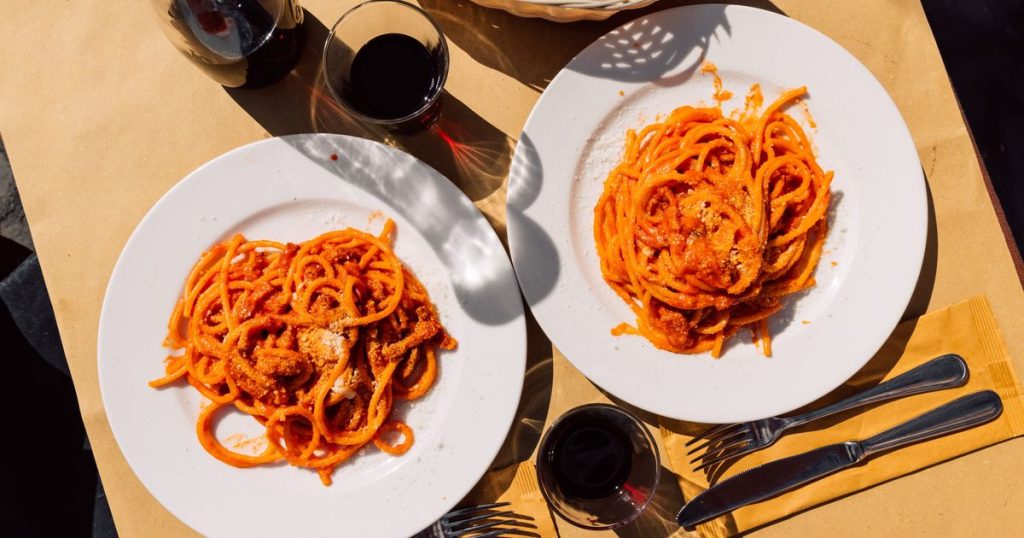It’s no secret that one of the best parts of a vacation is sampling the local cuisine. That’s especially true when you’re traveling to a city known for its five-star restaurants (I’m looking at you, New York, Los Angeles, Chicago, San Francisco, Asheville, the list goes on).
Of course, these multi-course meals prepared by Michelin-starred chefs don't come without consequences, especially in terms of your bank account. When home is a hotel with no kitchen and you eat all your meals out, things get expensive fast.
So how do you make the most of what the city you’re traveling to has to offer without ending up with a credit card bill that will make you regret going on vacation? We asked some finance and travel experts. Here’s what they had to say.
Enjoy the breakfast buffets.
If you want to treat yourself to an expensive dinner, don't be picky about your hotel's free breakfast buffet. “One of the easiest ways to save is to take full advantage of the free meals your accommodation may offer,” said Erika Küllberg, “Many hotels offer free breakfasts; some even offer buffet meals that are large enough to keep you full for most of the day.”
Ditch the cocktails.
No, we're not giving you this tip to help you avoid a hangover, although it's certainly a plus. “Drinks, especially alcoholic beverages, can quickly add up to a restaurant bill,” Kullberg says. “Skippling cocktails and wine and opting for tap water or a lighter drink like a local beer can cut costs significantly. If you're going to try a local drink, consider limiting yourself to just one and savor it as part of your dining experience.”
If you want to drink, Joshua ScottDirector of Food and Beverage at the Kimpton Harper Hotel in Fort Worth, Texas, suggests finding a good happy hour spot. “You can get the same amazing food or drinks, but at a much lower price,” he said.
Stock up on snacks.
Whether before you leave or once you arrive at your destination, it's a good idea to stock up on nutritious snacks. “Buying granola bars or other inexpensive snacks at the store can help you avoid feeling hungry throughout the day,” says Scott LiebermanFounder of Touchdown Money. “If you’re planning on visiting high-end restaurants, you don’t want to waste money on common dishes just because you’re hungry.”
Check the discounts.
According to Lieberman, even fancy restaurants offer promotions from time to time. “By checking their website or local coupon catalogs, you can find significant savings,” he said.
Giacomo Piva, a travel industry analyst and founder of travel blog Radical Storage, added that some apps can help you find discounts and deals at local restaurants. “Apps like The fork “I can help you discover and book restaurants offering special discounts with great reviews from locals and tourists,” he said.

web photographer via Getty Images
Find other ways to cut your expenses.
If food is your top priority when traveling, an expert in affordable luxury travel and personal finance Danielle Desire Corbett There are plenty of other ways to save, she says. “Find restaurants near your accommodations, ideally within walking distance, to help you avoid public transit costs, Uber rides or potential parking fees,” she said. “Additionally, some hotels may partner with local restaurants, offering the chance to take advantage of special discounts. Be sure to check out your tourism board’s website for exclusive dining packages, deals and upcoming restaurant events.”
Skip the protein and double the apps.
While this nutrition advice may be unpopular, Corbett says forgoing extra protein is a great way to save money. “Avoid extra proteins, like shrimp, chicken, or steak, which are often optional for salads and pasta dishes,” she says. “Choose the smaller portion option over the larger one, and to get a wider variety, consider choosing two appetizers (instead of one entrée).”
Eat like a local.
Residents of a foodie city may appreciate all the culinary specialties their city has to offer, but that doesn’t mean they indulge in them regularly. “To truly experience local cuisine without spending a fortune, don’t overlook street food and local markets,” Kullberg says. “These places often offer some of the most authentic and delicious glimpses into local food culture at a fraction of the cost of restaurants. They’re also a great way to interact with locals and discover dishes you might not find in a more formal setting.”
And if you're feeling adventurous, instead of Googling for highly rated restaurants, talk to locals. “If a restaurant is highly rated on Google, it usually means it's popular with tourists and therefore more expensive. Ask locals you meet on the street where they eat,” Kullberg adds.
While traveling is always a bit costly, especially if you're going to an expensive destination, there are ways to eat at great restaurants without breaking the bank. With a little planning and careful ordering, you'll be returning home well-fed and happy.


